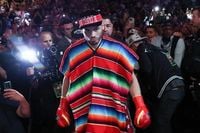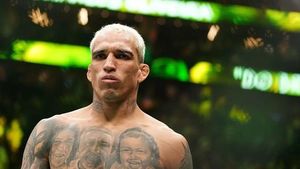Julio César Chávez Jr, once celebrated as a world boxing champion and son of a Mexican sports legend, now finds himself at the center of an international scandal that spans from the bright lights of Los Angeles to a prison cell in northern Mexico. The 39-year-old boxer was deported from the United States and admitted to a penitentiary outside Hermosillo, Sonora, following his arrest for overstaying his visa and allegedly lying on his green card application. But the charges he faces in Mexico are far more severe: authorities accuse him of arms and drug trafficking, and of serving as a henchman for the notorious Sinaloa Cartel.
The dramatic turn in Chávez Jr’s life unfolded swiftly. According to The Associated Press, Mexican President Claudia Sheinbaum confirmed at her daily press conference on August 20, 2025, that Chávez Jr had been handed over by U.S. authorities and was en route to face justice in Mexico. "I understand he was deported. I don't know if it was yesterday or this morning, but we were informed that he was arriving in Mexico," Sheinbaum stated.
Chávez Jr’s fall from grace has been years in the making. The investigation into his alleged cartel ties began in 2019, as Mexico’s attorney general Alejandro Gertz Manero told The Associated Press. The case against him reached a boiling point in July 2025, when U.S. Immigration and Customs Enforcement agents arrested him in Los Angeles—just days after his high-profile boxing match against YouTuber-turned-fighter Jake Paul in California. The loss in the ring was soon overshadowed by his legal troubles outside it.
According to ABS-CBN, Chávez Jr’s deportation was triggered by his alleged connections to the Sinaloa Cartel, one of Mexico’s most powerful and dangerous drug trafficking organizations. The U.S. Department of Homeland Security (DHS) described the Sinaloa Cartel as a foreign terrorist organization earlier in 2025, underscoring the gravity of Chávez Jr’s alleged involvement. Mexican media, citing prosecutor’s documents, reported that Chávez Jr was suspected of acting as a hitman for the cartel, with one witness claiming, “He hangs them [and] grabs them like a punching bag,” as quoted by Reforma newspaper.
The U.S. DHS added further intrigue to the case by revealing details of Chávez Jr’s immigration history. He entered the United States legally in 2023 on a tourist visa valid until February 2024. In April 2024, he applied for permanent residency, citing his marriage to a U.S. citizen. However, according to DHS, his wife was herself connected to the Sinaloa Cartel through a prior relationship with the now-deceased son of Joaquin ‘El Chapo’ Guzmán, the infamous cartel leader. This tangled web of relationships only deepened suspicion and scrutiny from law enforcement on both sides of the border.
Chávez Jr’s legal woes in the U.S. were not limited to immigration violations. In January 2024, Los Angeles police arrested him for possessing two AR-style ghost rifles—firearms that are hard to trace because they lack serial numbers. He was released on a $50,000 bond, on the condition that he enter a residential drug treatment facility, as reported by The Associated Press. The case remains pending, with Chávez Jr required to check in regularly with authorities.
His criminal record in the U.S. also includes a conviction for drunken driving in Los Angeles in 2012, for which he served 13 days in jail. These incidents, combined with multiple failed drug tests, suspensions, and missed weights throughout his boxing career, paint a picture of a once-promising athlete beset by personal demons and poor decisions.
The U.S. government’s decision to deport Chávez Jr came amid renewed crackdowns on immigrants under President Donald Trump’s administration, which has vowed to deport millions. DHS Assistant Secretary Tricia McLaughlin remarked in a July 3 statement, “Under President Trump, no one is above the law—including world-famous athletes.” The statement also expressed astonishment that the previous administration had not prioritized Chávez Jr’s deportation, given the severity of the allegations against him.
Upon his return to Mexico, Chávez Jr’s defense team launched a series of legal appeals in an attempt to block his prosecution on home soil. However, Mexican courts rejected all of these efforts, clearing the way for his transfer to a high-security facility in Sonora. The country’s National Detention Registry confirmed his admission on August 18 or 19, 2025, according to Mexican authorities.
The shadow of his father, Julio César Chávez Sr, looms large over the saga. The elder Chávez, revered as one of the greatest boxers in history, held multiple world titles between 1984 and 1996 and was a national icon in Mexico. He has publicly defended his son, especially after his arrest, but has remained silent since the deportation. Notably, Chávez Sr himself was no stranger to the world of drug traffickers, having mixed social circles with notorious figures and even claiming friendship with Amado Carrillo Fuentes, a major drug lord.
Despite the gravity of the charges, Chávez Jr’s achievements in the ring were once a source of pride for his family and fans. He won the WBC middleweight title in 2011 and defended it three times, sharing the ring with legendary fighters such as Canelo Álvarez and Sergio Martinez. Yet, his intermittent dedication to the sport and ongoing battles with addiction often overshadowed his talent. As The Associated Press observed, his career has been marked by “failed drug tests, serving suspensions and egregiously missing weight while being widely criticised for his intermittent dedication to the sport.”
Now, as he sits in a Mexican prison awaiting trial, the future for Julio César Chávez Jr looks uncertain. The charges he faces—arms and drug trafficking, alleged roles as a cartel hitman, and his entanglement in a cross-border legal drama—underscore the complex and often perilous intersection of fame, family legacy, and organized crime in Mexico.
For the millions who once cheered his rise in the boxing world, Chávez Jr’s story is a sobering reminder that the line between glory and downfall can be perilously thin. The coming months will determine whether he can mount a defense against the most serious accusations of his life, or if his legacy will be forever altered by the shadows now engulfing him.




